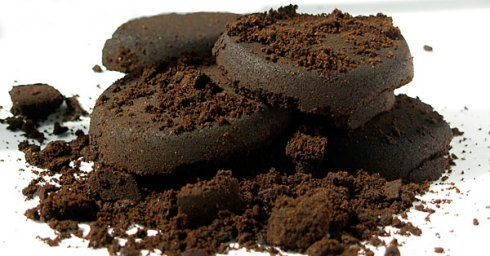The craft of low-carbon housewives in Tokyo, Japan, put coffee grounds in smelly socks to remove the smell.

When I first arrived in Tokyo, what impressed me most was not the exquisite sushi and the beautiful metropolitan scenery, but the frugal style of Japanese housewives and the tenacious spirit of "low-carbon" life. This is not the individual behavior of one or two people, but a kind of ideological identity in a general sense. Thrifty Japanese housewives have a good sense of housekeeping, and the landlady who rents a house to me is no exception. She not only takes the "low-carbon" route, but also reminds me from time to time to join the "low-carbon" ranks and move forward with her.
The landlady is a beautiful housewife and the house is spotless. There is a piece of paper affixed to the refrigerator door with the name and quantity of all the food in the fridge written on it. Cross it off with a pen every time you eat it, so you can reduce the number of times you open the refrigerator. Each extra opening of the refrigerator door wastes 0.01 kilowatt-hours of electricity, which can save at least 60 kilowatt-hours a year, she said. Do you know? For every kilowatt-hour of electricity saved, the emission of carbon dioxide can be reduced by 1 kilogram.
The clever landlady will turn waste into treasure. Some of the empty milk boxes are washed and trimmed, wrapped in beautiful wrapping paper and used as a base for flower arrangement, while the other part is simply cut off to make a cake mold. Spread the rest on the board, cutting things can reduce the wear and tear on the board. The old stockings are filled with drunk tea or coffee grounds, tied with a beautiful bow and a boot deodorant bag. As for the food waste from the kitchen, it is put into a special sealed bucket and used for composting. The flowers and plants on her balcony depend on these fertilizers.
She will also skillfully use the microwave oven to make delicious food, lump salt and sugar, pour it on a paper towel, wrap it up, and rub it with her hands to restore it to its original state. Radish, potato, pumpkin and other root vegetables are time-consuming and time-consuming to cook. First cover the cling film and turn it in the microwave oven for a few minutes, which can save a lot of gas.
All the light bulbs in her house are energy-saving, and try not to use multiple lamp holders. When washing clothes, she does not use the washing machine to dry the clothes, but lets them dry naturally. She says this can reduce carbon dioxide emissions by two kilograms. When processing food in the microwave, she will cover the food with cling film and use a toothpick to pierce a few small holes to breathe. In this way, the moisture of the food does not evaporate easily, tastes good and saves electricity. The water at home has always been recycled, washing faces and vegetables to flush the toilet. Usually the whole family will eat more low-fat, low-salt food, eat more fresh vegetables, basically do not eat fried food.
She will unplug all the power in the room, including the refrigerator, before going out. Refrigerators are highly used in summer and can be reduced in winter, she said. On the other hand, I was ashamed to think that after living in China for many years, my refrigerator at home has always been the same all the year round and is always plugged in.
When I went to watch TV at the landlady's house in the evening, I found that she did not turn on the light and kept the screen brightness to a minimum. It immediately occurred to me that I used to forget to turn off the lights and TV when I went to bed at night.
The "low-carbon" life of Japanese housewives is an eye-opener and benefits me a lot. Now I have also become a "low-carbon family".
Source: Sina
Important Notice :
前街咖啡 FrontStreet Coffee has moved to new addredd:
FrontStreet Coffee Address: 315,Donghua East Road,GuangZhou
Tel:020 38364473
- Prev

I really want to sit at the floor-to-ceiling window and drink coffee and feel the private space brought by coffee.
I want to sit alone at a French window like this and drink coffee. I want to be alone at a French window like this.
- Next

Super practical: teach you the secret of how to order a satisfactory cup of coffee at Starbucks in English
Are you a coffee addict? Which brand do you like best if you don't leave your coffee? Let the editor guess, are more than N children's shoes choose it is Starbucks (Starbucks)? So here's the problem! Are you dizzy in the face of the huge and complicated order of Starbucks? If you are abroad, can you really order a satisfactory cup of coffee in English? If not
Related
- What brand of black coffee is the most authentic and delicious? what are the characteristics of the flavor of the authentic Rose Summer Black Coffee?
- Introduction to the principle and characteristics of the correct use of mocha pot A detailed course of mocha pot brewing coffee is described in five steps.
- Which is better, decaf or regular coffee? how is decaf made?
- How much is a bag of four cat coffee?
- How about four Cat Coffee or Nestle Coffee? why is it a cheap scam?
- Which is better, Yunnan four Cats Coffee or Nestle Coffee? How about cat coffee? is it a fake scam? why is it so cheap?
- How about Cat Coffee? what grade is a hoax? which instant coffee tastes better, four Cat Coffee, Nestle Coffee or G7 coffee?
- Process flow chart of coffee making-Starbucks coffee making process what coffee tastes good at Starbucks
- The top ten best coffee beans in the world Rose summer coffee or Tanzanian coffee tastes good
- Yunnan four cat coffee is good to drink?_four cat coffee is a big brand? four cat blue mountain coffee is fake?

